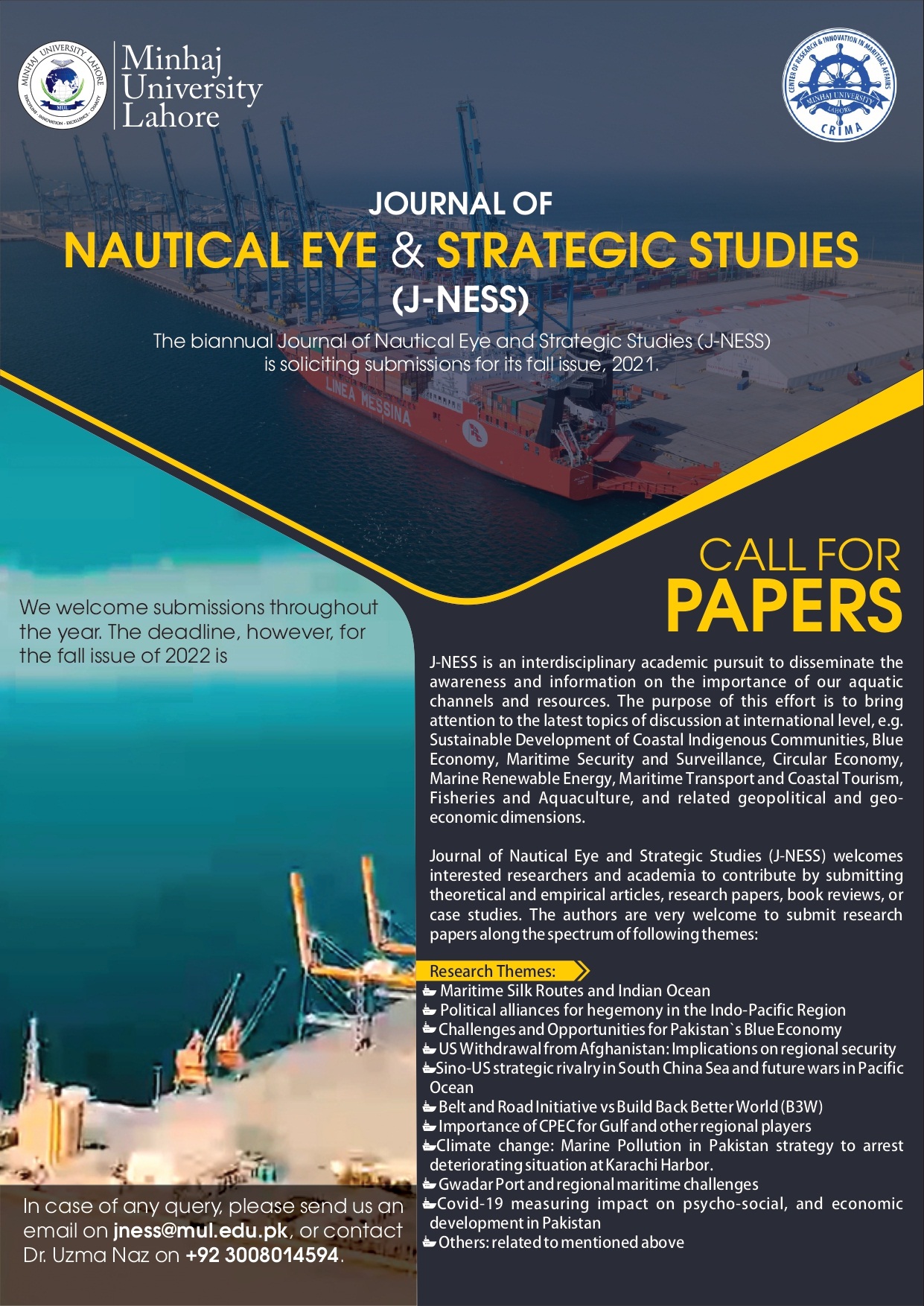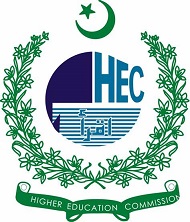Pakistan's Strategic Imperatives and Maritime Security Challenges in the Indian Ocean
DOI:
https://doi.org/10.58932/MULG0022Keywords:
Sea Lines of Communication, Indian Ocean, Pacific Ocean, Superpower Competition, Regional SecurityAbstract
Sea Lines of Communications, or SLOCs, have become an epicenter of strategic dispositions and partnerships in Southeast Asia. This research focuses on superpower influence in the region and how it ranges from securing islands within the Indian and Pacific Oceans to securitizing nontraditional elements of national power such as semiconductors and political alignments. This research also measures the impact of these measures and how they have indicated a change in basic assumptions in littoral states in the region like Pakistan, India, and China. The research analyses the strategies of these states towards their maritime relevance and interests in the region. Economic posturing and military modernization drive are supplemented by strategies specifically designed to address maritime vulnerabilities and opportunities in SLOCs. India’s Security and Growth for All in the Region (SAGAR) strategy, coupled with its naval deployments in the islands of the Indian Ocean, is one example. China-Pakistan-India submarine modernization initiatives and Indo-US Quadrilateral Security Commitments are some of the key elements this research scrutinizes. The research suggests that due to new strategies and the role of extra-regional players, Pakistan’s position in the region requires a deeper and thorough reassessment of its naval strategies beyond the traditional lens. It also recommends seeking a bigger, more pronounced role in SLOC politics of the Indian Ocean and even considering developing contingencies to prevent a spillover of strategic competition from the Pacific Ocean contenders.
References
Ahmad, S. (2023). Track Two Diplomacy Between India and Pakistan. Taylor & Francis.
Alam, S. F. A. F. (2020, June 1). Maritime Geopolitics in the Indian Ocean: China Bid for Regional Dominance. Retrieved from https://ideas.repec.org/p/smo/spaper/041sf.html.
ALI, G. (2019). China–Pakistan Maritime Cooperation in the Indian Ocean. Issues & Studies, 55(03), 1940005. https://doi.org/10.1142/s1013251119400058
Allauddin, Liu, H., & Ahmed, R. Q. (2020). The Changing Dynamics and New Developments of China–Pakistan Relations. India Quarterly: A Journal of International Affairs, 76(1), 73–88. https://doi.org/10.1177/0974928419901195
Asif, D. M. (2023). Blue Economy and Power Politics in the Indian Ocean: Challenges and Opportunities. Journal of Nautical Eye and Strategic Studies, 2(2), 2–37. https://doi.org/10.58932/mulg0003
Chang, Y. C., & Khan, M. I. (2019). China–Pakistan economic corridor and maritime security collaboration. Maritime Business Review, 4(2), 217–235. https://doi.org/10.1108/mabr-01-2019-0004
Ertör, I., & Hadjimichael, M. (2019). Editorial: Blue degrowth and the politics of the sea: rethinking the blue economy. Sustainability Science, 15(1), 1–10. https://doi.org/10.1007/s11625-019-00772-y
Fatima, & Jamshaid. (2015). The Political and Economic Significance of Indian Ocean: An Analysis. Retrieved November 29, 2023, from http://journals.pu.edu.pk/journals/index.php/IJSAS/article/view/3006.
Fayyaz, M. (2019, October 25). China-Pakistan Economic Corridor (CPEC): The Road to Indian Ocean and its Geopolitical implications for the India-Pakistan Strategic Relations. Retrieved from https://www.academia.edu/40733945/China_Pakistan_Economic_Corridor_CPEC_The_Road_to_Indian_Ocean_and_its_Geopolitical_implications_for_the_India_Pakistan_Strategic_Relations.
Gholizadeh, A., Madani, S., & Saneinia, S. (2020). A geoeconomic and geopolitical review of Gwadar Port on belt and road initiative. Maritime Business Review, 5(4), 335–349. https://doi.org/10.1108/mabr-11-2019-0051
Gong, X. (2020). Non-traditional security cooperation between China and south-east Asia: implications for Indo-Pacific geopolitics. International Affairs, 96(1), 29–48. https://doi.org/10.1093/ia/iiz225
Grare, F., & Samaan, J. L. (2022). The Indian Ocean as a New Political and Security Region. https://doi.org/10.1007/978-3-030-91797-5
HABIBA, U. E., & Abbas, S. Q. (2023). Maritime Power Play in the Indian Ocean and Challenges for Pakistan Navy. Journal of Research in Social Sciences, 11(1). https://doi.org/10.52015/jrss.11i1.183
HABIBA, U. E., & Abbas, S. Q. (2023). Maritime Power Play in the Indian Ocean and Challenges for Pakistan Navy. Journal of Research in Social Sciences, 11(1). https://doi.org/10.52015/jrss.11i1.183
Ismail, A. (2021). Revealing Indonesia’s Reluctance to Participate in the Regional Cooperation Agreement on Combating Piracy and Armed Robbery against Ships in Asia (ReCAAP). Indonesian Journal of Peace and Security Studies (IJPSS), 3(1), 1–13. https://doi.org/10.29303/ijpss.v3i1.55
Karim, A., Naazer, M. A., Mahmood, A., & Bukhari, S. (2023). Maritime dimension of Modi’s foreign policy: Indo-Gulf maritime cooperation and its implications for Pakistan. Liberal Arts and Social Sciences International Journal (LASSIJ), 7(1), 202–220. https://doi.org/10.47264/idea.lassij/7.1.12
Karim, A., Naazer, M. A., Mahmood, A., & Bukhari, S. (2023). Maritime dimension of Modi’s foreign policy: Indo-Gulf maritime cooperation and its implications for Pakistan. Liberal Arts and Social Sciences International Journal (LASSIJ), 7(1), 202–220. https://doi.org/10.47264/idea.lassij/7.1.12
Kim, M., Joung, T. H., Jeong, B., & Park, H. S. (2020). Autonomous shipping and its impact on regulations, technologies, and industries. Journal of International Maritime Safety, Environmental Affairs, and Shipping, 4(2), 17–25. https://doi.org/10.1080/25725084.2020.1779427
Li, M. (2020). The Belt and Road Initiative: geo-economics and Indo-Pacific security competition. International Affairs, 96(1), 169–187. https://doi.org/10.1093/ia/iiz240
Mehmood, Z. H., & Khan, R. (2021). Assessing Indian Ocean Economics: Perspective from Pakistan. Andalas Journal of International Studies (AJIS), 10(1), 1. https://doi.org/10.25077/ajis.10.1.1-15.2021
Muhammad Javed Iqbal, K., & Bilal Haider, B. (2020). Geo-political and Geo-economic Dynamics of the Region in Developing the Sea-based Economy of the IOR Countries. Polaris – Journal of Maritime Research, 2(1), 1–22. https://doi.org/10.53963/pjmr.2020.002.2
Onyango Ogutu, M. (2021). The Indian Ocean Rim Association: Lessons from this regional cooperation model. South African Journal of International Affairs, 28(1), 71–92. https://doi.org/10.1080/10220461.2021.1915863
Qayyum, S. (2021). Strategic Analysis of Maritime Situation in Indian Ocean- Challenges and Prospects for Pakistan. Polaris – Journal of Maritime Research, 3(1), 1–1. https://doi.org/10.53963/pjmr.2021.003.3
Qazi, S., & Farooq, I. F. (2023). Restructuring Strategic Maritime Interests and Blockade Politics in the Indian Ocean. Journal of Security & Strategic Analyses, 8(2), 104–123. https://doi.org/10.57169/jssa.008.02.0198
Rahman, Z. U., Ishaq, M., & Naeem, M. (2023). A critically analysis of Gwadar port in the changing maritime scenario. Australian Journal of Maritime & Ocean Affairs, 1–20. https://doi.org/10.1080/18366503.2023.2164998
Rahman, Z. U., Khan, A., Lifang, W., & Hussain, I. (2021). The geopolitics of the CPEC and Indian Ocean: security implication for India. Australian Journal of Maritime & Ocean Affairs, 13(2), 122–145. https://doi.org/10.1080/18366503.2021.1875807
Rizvi. (2002). Pakistan’s strategic culture. South Asia in 2020.
Roy, A. (2021, August 30). Blue Economy in the Indian Ocean: Governance perspectives for sustainable development in the region. Retrieved from https://policycommons.net/artifacts/1347623/blue-economy-in-the-indian-ocean/1959780/
Shah, S. A. H., Rafique, D. M. U., & Rasool, S. (2020). GEOPOLITICAL IMPLICATIONS OF THE INDIAN OCEAN AND MARITIME SECURITY CHALLENGES FOR PAKISTAN. Issue-2, 04(02), 431–451. https://doi.org/10.36968/jpdc-v04-i02-23
Shah, S. A. H., Rafique, D. M. U., & Rasool, S. (2020). GEOPOLITICAL IMPLICATIONS OF THE INDIAN OCEAN AND MARITIME SECURITY CHALLENGES FOR PAKISTAN. Issue-2, 04(02), 431–451. https://doi.org/10.36968/jpdc-v04-i02-23
The Geo-Economics and Geopolitical Significance of Gwadar Port in theChanging Maritime Scenario. (2022). FWU Journal of Social Sciences, 121–132. https://doi.org/10.51709/19951272/winter2022/9
Upadhyaya, S. (2022). Naval humanitarian assistance and disaster relief (HA/DR) operations in the Indo-Pacific region: need for fresh thinking. Journal of the Indian Ocean Region, 18(3), 282–294. https://doi.org/10.1080/19480881.2023.2198887
Zafar, N. (2020, October 10). Building Maritime Security in Pakistan—The Navy Vanguard. https://doi.org/10.1007/978-3-030-50064-1_4
Downloads
Published
How to Cite
Issue
Section
License
Copyright (c) 2023 Journal of Nautical Eye and Strategic Studies

This work is licensed under a Creative Commons Attribution-NonCommercial 4.0 International License.











